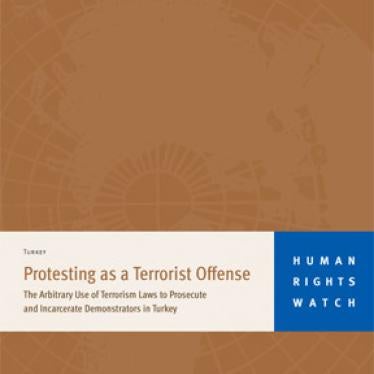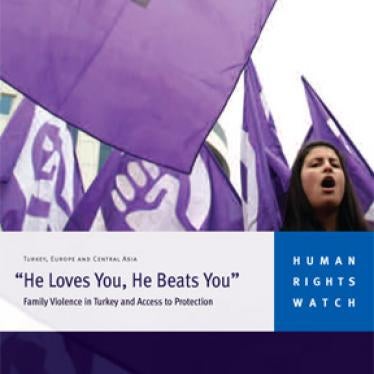Dear Prime Minister Erdoğan,
I am writing following the recent re-election of the Justice and Development Party, giving it an historic third term in government.
In its second term, your government pursued an ambitious foreign policy, showing resolve in raising Turkey's international role and regional prominence. At home, the government took steps to bring to an end the system of military tutelage which has held sway in Turkey throughout the Republic and to secure better civilian oversight of the military, a precondition for any democratizing country.
In general, however, the domestic reform undertaken by the government in its second term failed to match the bold reach of its foreign policy, or to build on the early progress made on human rights and the rule of law during its first term in office, especially in the period up to 2005.
Your government's third term creates an unprecedented opportunity to build on the legacy of those early reforms and demonstrate at home and abroad the central importance of human rights and the rule of law in Turkey. In that context, this letter sets out some key priorities for your government to address.
New constitution
A new constitution should be an immediate priority for the new government. It is agreed across the political spectrum that the current constitution includes many provisions which impede the enjoyment of fundamental rights and freedoms and the rule of law.
A fully transparent and inclusive process is critically important to the success of the constitution. The 326 seats secured by your party mean that the government will need to work with opposition parties to secure constitutional reform. To achieve consensus, the government should consult fully with civil society and academics, as well as opposition parties.
The new constitution should remove restrictions on freedom of expression and association, uphold the rights of all groups in Turkey and end discrimination against Turkey's various ethnic groups by removing language referring to ethnic identity. It should guarantee the separation of powers, strengthen the role of parliament and limit the powers of the president, ensure the independence of the judiciary, and secure full civilian oversight of the military.
Upholding rights of Kurds and other ethnic and religious minority groups in Turkey
Turkey's role as a regional power will always be in doubt until it takes firm steps to uphold the rights of Kurds and all other ethnic and religious groups. Towards solving Turkey's Kurdish problem, the government should end restrictions on peaceful political association, on representation in parliament, on freedom of expression, and on the right to benefit from mother-tongue language education in school. Moving ahead with a new constitution, and the subsequent revision of many laws constitutional reform will necessitate, will contribute importantly to this process. Ending the restrictions on the right of children to learn to read and write in mother-tongue languages including Kurdish would be an important first step.
In addressing these issues, your government should look to cross party support in parliament. The main opposition Republican People's Party (CHP) with 135 seats in parliaments pledged in its election campaign to address the human rights of Kurds in Turkey. The 36 candidates who won seats as independents and who will form a Peace and Democracy Party (BDP) group in the new parliament will also be pushing for constitutional reforms to tackle the issues.
The pledge by your government in 2009 to launch a "democratic opening" to address the Kurdish problem in Turkey and to uphold the rights of all groups in the society, including the heterodox Alevi religious minority, and Roma, represented a ground-breaking shift of language. But it failed to translate into concrete changes on the ground.
Flying in the face of any "democratic opening" has been the ongoing clampdown on the legal political activities of hundreds of Kurdish officials and activists of the BDP, who face charges of membership of the armed Kurdistan Workers' Party (PKK) for their alleged connections with the Union of Kurdistan Communities (KCK). The defendants on trial in at least 16 different cases have faced prolonged pretrial detention, and Human Rights Watch has concerns about the weak evidential basis for the case against many. Turkey's over broad definition of terrorism still allows for the arbitrary imposition of the harshest terrorism charges against individuals about whom there is little evidence of logistical or material support for terrorism, or involvement in plotting violent activities (see Human Rights Watch's November 2010 report: ‘Protesting as a Terrorist Offense: The arbitrary use of terrorism laws to prosecute and incarcerate demonstrators in Turkey').
In the framework of reviving the "democratic opening," and to ensure respect for human rights, your government should take steps to end the arbitrary use of terrorism laws against those who express critical opinions, join protests or engage in non-violent political activities.
Upholding women's rights
While your government took important steps in its last term to improve women's rights in the international arena, such as becoming the first signatory to the Council of Europe Convention Against Domestic Violence and Violence Against Women, there remains a pressing need to address the domestic rights deficit for women in Turkey and to fulfill the obligations under domestic and international law to offer women protection from violence and to uphold their security of life.
The new government should revise its decision to abolish the Ministry for Women and the Family in favor of a new Ministry for the Family and Social Policies. It should instead increase the dedicated focus on women and strengthen institutions working to uphold women's rights (such as the General Directorate for the Status of Women) in order to combat gender inequality, discrimination and the record of endemic violence against women in Turkey (documented in Human Rights Watch's May 2011 report: ‘"He loves you, he beats you": Family Violence in Turkey and Access to Protection'). The government should specifically improve the protection mechanism of the Family Protection Law (no. 4320) to include all women and enforce protection orders more rigorously.
While the new parliament will have 78 women parliamentarians (out of 550), an increase of 28 on the previous parliament, greater efforts are also needed by your government to ensure the participation of women in political life and in the workplace. Women make up only 27 percent of the paid work force in Turkey, with only 19 percent of them in income-generating work.
Ending unfair trials in Turkey
The government should make the reform of the criminal justice system a priority, and implement the many decisions of the European Court of Human Rights which have found Turkey to violate fair trial rights.
The weakness in Turkey's criminal justice system coupled with vaguely drawn laws restricting freedom of expression, assembly and association lead to persistent human rights violations.
Key problems highlighted by the European Court of Human Rights that should be prioritized by the government include prolonged pre-trial detention, and excessive length of proceedings, arising from infrequent court hearings (with defendants often having to wait several months between hearings, delays which are especially concerning in the case of defendants held in pretrial detention).
Your government should also move to abolish the separate system of heavy penal courts whose remit is terrorism offenses and organized crime. The stricter regime operated by these courts undermine defendants' rights. Prosecutors in these courts routinely impose secrecy orders on criminal investigations for suspected crimes, denying defendants the opportunity to know the full evidence against them, and undermining the ability of those in pretrial detention to successfully apply for bail, often resulting in abusive prolonged pretrial detention.
Freedom of expression
While the last decade has demonstrated the momentum in Turkey for increasingly open debate on even controversial issues, Turkey's laws, prosecutors, judges and politicians are still lagging behind. Demonstrating a commitment to free expression should be a priority for your government. Prosecutors frequently prosecute individuals for non-violent speeches and writings, and journalists for reporting on trials and criminal investigations, or for making terrorist propaganda. Politicians sue their critics for criminal defamation. Courts vindicate these prosecutions without having due regard to the obligations to protect the right to freedom of expression. Your government should undertake a comprehensive review of all existing laws that restrict freedom of expression, including provisions in the Anti-Terror Law.
The worrying trend on freedom of expression is illustrated by the internet filtering plan put into place by your government during its previous term. Under the plan from August 22 onwards all internet users will be obliged to use internet filter packages at home and at work in order to be able to have internet access. As you know the measure was introduced through a regulation and not a law passed by parliament. In the assessment of Human Rights Watch and other independent observers, it will impose what is essentially a government-controlled internet filter system on all users. The regulation notably lacks detail on the criteria for filtering, while offering no possibility for individuals to challenge decisions to restrict sites. Human Rights Watch already has concerns about the practice of frequent websites bans in Turkey as restrictive of freedom of expression and a violation of the right of citizens to access information. As a matter of priority, the new government should withdraw the new regulation on compulsory internet filtering packages and allow individuals a free choice on whether or not to subscribe to a filter.
Combating police violence and impunity
The government should take immediate steps to launch full enquiries into the policing of a demonstration against the government in the Black Sea town of Hopa on May 31 and over the course of subsequent days, as well as into police conduct during an Ankara protest against the Hopa incidents that took place in the late afternoon of May 31. During the Hopa demonstration retired teacher Metin Lokumcu died from excessive tear gas exposure and police reportedly used excessive force in dispersing demonstrators and tortured and ill-treated detainees. Police violence was again in evidence during the Ankara protest.
The events in Hopa and Ankara are part of a pattern of police violence against demonstrators documented by Human Rights Watch over many years (and discussed in our 2008 report: Closing Ranks against Accountability: Barriers to Tackling Police Violence in Turkey). In this case as in others the government should ensure that officers responsible for ill-treatment, torture or excessive use of force are held to account, and senior officers investigated for the conduct of officers under their authority.
Syria and the UN Security Council Resolution
The past few weeks have seen the Syrian security forces turn ruthlessly on a mainly unarmed civilian population exercising the legitimate right to demonstrate for their rights. Despite the efforts of Syrian authorities to prevent access to the country, Human Rights Watch research has established that Syrian security forces have killed hundreds of protesters and arbitrarily arrested thousands, many of whom, including children, have been beaten and tortured. The systematic and deliberate nature and scale of the government's abuses in the Daraa governorate, where at least 418 people have been killed and many others tortured, including children, suggest that they qualify as crimes against humanity.
Human Rights Watch welcomes the fact there have been no reports of refoulement and that Turkey has kept its border open to thousands of Syrians fleeing the crackdown in and around Jisr al-Shughour.
We welcome your condemnation of the "savagery" of the Syrian state's response to the legitimate demands of its population, and urge you and your government to publicly support efforts in favor of a UN Security Council resolution demanding an immediate end to the Syrian government's brutal crackdown.
I would welcome an opportunity to discuss these important issues with you in person, ideally in the fourth quarter of 2011.
Yours sincerely,
Kenneth Roth
Executive Director
Human Rights Watch








